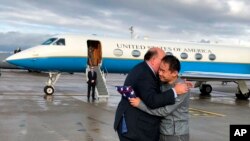U.S. President Donald Trump has thanked Iran for releasing a Chinese American academic it had detained since 2016 in exchange for the U.S. freeing an Iranian scientist arrested last year.
In a Saturday tweet that marked a shift by Trump to a positive tone on Iran, he thanked it for a "very fair negotiation" that led to the exchange of prisoners earlier in the day. "See, we can make a deal together!" he added.
Trump repeatedly has said he’s willing to talk with Iran about ending its perceived malign activities as part of a deal to replace a 2015 nuclear agreement that Tehran reached with six world powers. The U.S. president withdrew from that deal last year, saying it was not tough enough on Iran.
'Brutal crackdown'
But in recent days, Trump and senior U.S. officials had used tough language to criticize Iran for its violent suppression of anti-government protests that erupted nationwide last month. As recently as Thursday, Trump said Iran had killed hundreds of its own people in a "brutal crackdown." He predicted that the "horrible situation" would become a "big scandal throughout the world very soon."
Britain-based rights group Amnesty International has said it received credible reports of Iranian security forces killing at least 208 protesters in last month's crackdown. Iran has disputed that figure without providing its own death toll.
In another Saturday tweet, U.S. Secretary of State Mike Pompeo also had positive words for Tehran's role in the prisoner swap, saying, "We are pleased the Iranian government has been constructive in this matter." He thanked the Swiss government for mediating the deal.
Switzerland has been representing U.S. interests in Iran since 1980, the year after Iranian clerics hostile toward America seized power in an Islamic revolution.
Trump vowed, also on Twitter, that the U.S. "will not rest until we bring every American wrongfully detained in Iran and around the world back home to their loved ones."
The exchange of prisoners happened in Switzerland at Zurich airport, where Iranian authorities had brought Chinese American graduate student Xiyue Wang and U.S. authorities had brought Iranian scientist Massoud Soleimani.
The first word of the swap came from a tweet by Iranian Foreign Minister Mohammad Javad Zarif, who said he was "glad" that both Soleimani and Wang would be joining their families soon and posted a photo of Soleimani sitting in a room in an unspecified location. Zarif later tweeted more photos showing him posing with Soleimani next to an Iranian plane at Zurich airport and sitting next to the scientist on the flight home.
In a similar tweet, the U.S. State Department posted a photo of U.S. Special Representative for Iran Brian Hook posing with Wang next to an American plane at the airport, along with a message saying, "Can't wait to welcome you back home."
The plane flew Hook and Wang to a U.S. airbase in Ramstein, Germany, where Wang was due to be taken to the nearby Landstuhl hospital for examination by doctors, according to an unnamed U.S. official quoted by the Associated Press.
Iran had detained Wang as he visited the country on a Princeton University research assignment in August 2016, accusing him of espionage and later sentencing him to 10 years in prison. His family and university strongly denied the allegation and campaigned for his release.
Wang's wife, Hua Qu, expressed her delight with his release in a tweet, saying, "Our family is complete once again. Our son Shaofan and I have waited three long years for this day."
Princeton University President Chris Eisgruber released a statement thanking all those who had worked for Wang's release, including the U.S. and Swiss governments, and the university's students and staff.
In a phone interview with VOA Persian, Princeton spokesman Ben Chang said the university had been helping students and faculty members make regular and sometimes daily phone calls to Wang while he was in prison to maintain Wang's connection to his community.
"Now we're eager to welcome him back to our campus," Chang added.
U.S. authorities had arrested Soleimani, a stem cell researcher, last year on charges of violating U.S. sanctions by trying to take biological material into Iran. Soleimani had maintained his innocence and was due to appear in a U.S. court next week, but prosecutors dropped all charges against him, paving the way for his release.
Speaking to VOA Persian, Iran analyst Behnam Ben Taleblu of the Foundation for Defense of Democracies said he expected details of the diplomatic efforts that produced the prisoner swap to emerge in the coming days. He said such details might include additional conditions that the U.S. and Iran may have accepted to facilitate the deal.
Levinson case
Family members of Robert Levinson, a retired FBI agent who they believe has been detained by Iran since he went missing on a visit to the county in 2007, welcomed Wang's release in a statement to VOA Persian but described the news as "bittersweet."
"We can't help but be extremely disappointed that, despite all its efforts, the U.S. government was unable to secure [Levinson's] release, especially after such a painful week for our family," the statement said.
Levinson's wife and seven children appeared in a U.S. district court in Washington this week to give sometimes tearful testimony about the suffering they have endured since his disappearance. The family is suing Iran for $1.5 billion in damages. Iranian officials repeatedly have denied knowledge of his whereabouts in public statements.
U.S. officials have said they are committed to solving the mystery of Levinson's disappearance.
"One can only hope that the Trump administration's intentions carry through to next year, and that more Americans and U.S. dual nationals who are held against their will across the world actually do make their way home to freedom," Taleblu said.
This article originated in VOA's Persian service.




